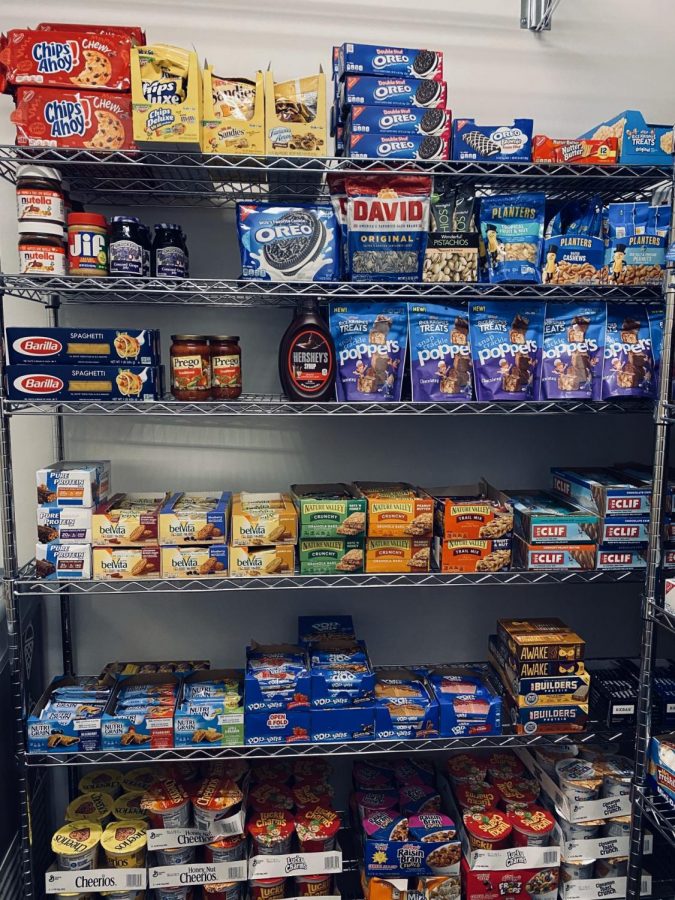Why Sustaining Your Regional Food Pantry Is Vital for Helping Those in Need
The value of sustaining neighborhood food pantries can not be overstated, particularly in the context of food insecurity, which affects a worrying variety of people and family members within our areas. These necessary sources not just provide immediate relief from hunger but also add to broader societal benefits, consisting of improved health and academic outcomes. As we discover the multifaceted function of food pantries, it ends up being obvious that their effect prolongs far past simply dispersing food (Food Pantry Lockhart). Recognizing this much deeper link may prompt a reconsideration of how we involve with and sustain these essential establishments.
Recognizing Food Insecurity
Food instability impacts roughly 10.5% of households in the USA, showing a significant public wellness problem that transcends plain appetite. It refers to the absence of constant access to sufficient food for an active, healthy and balanced life. This condition can cause a series of adverse end results, consisting of bad health, raised healthcare prices, and diminished academic efficiency among kids.
The root causes of food insecurity are complex, commonly stemming from financial factors such as destitution, unemployment, and underemployment. Geographical location can likewise play a crucial function, with food deserts-- locations with limited accessibility to nourishing and affordable food-- aggravating the issue - Food Pantry Lockhart. Furthermore, systemic variables, including racial and social injustices, add to the disproportionate effect of food instability on marginalized communities
Attending to food instability is not just about enhancing food supply; it calls for an extensive strategy that includes financial security, education, and community support. Food insecurity not only affects individual well-being but likewise has wider effects for social wellness and performance. Recognizing its intricacy is essential for developing effective interventions and fostering long-term solutions that ensure all individuals have dependable access to nutritious food.
The Duty of Food Pantries
Neighborhood food cupboards work as important lifelines for people and households encountering food instability. They offer vital food items to those that might struggle to afford ample nourishment because of economic hardship, joblessness, or unpredicted conditions. By dispersing food at no charge, these organizations help reduce hunger and avoid the unfavorable wellness influences related to insufficient diet regimens.
Food cupboards often companion with regional farms, grocery store shops, and neighborhood companies to source a selection of healthy food items, consisting of fresh fruit and vegetables, milk, and healthy proteins. This cooperation guarantees that pantry clients obtain not only nutrition but additionally healthier choices that add to general health.
Moreover, food kitchens function as community centers, cultivating connections amongst residents and offering a feeling of dignity to those in need. Several kitchens supply Related Site additional resources, such as nourishment education and learning and referrals to social solutions, aiding customers navigate their difficulties better.
Fundamentally, food cupboards play a multifaceted role in combating food insecurity. They not only address instant cravings but likewise equip families and people to boost their scenarios, thus advertising community durability and cohesion.

Advantages of Supporting Food Pantries

Supporting food kitchens not just nurtures those in demand however additionally strengthens the material of the area. By providing necessary food resources, food kitchens relieve hunger and minimize food instability, which is crucial for the wellness and health of individuals and households. Access to healthy food adds to boosted physical health, much better instructional outcomes for children, and improved psychological wellness, thus cultivating a more effective and engaged community.
Additionally, supporting food pantries advertises social cohesion. These organizations act as centers for neighborhood involvement, uniting volunteers, donors, and recipients in a shared mission to deal with hunger. This cooperation can break down barriers, foster understanding, and build relationships among diverse community members.
Additionally, donations to food pantries, whether in the kind of food, funds, or time, stimulate the neighborhood economic climate. Numerous food kitchens prioritize sourcing from local producers, hence sustaining regional agriculture and companies. This creates a cycle of support that profits not just those in requirement but the community as a whole.
How to Obtain Included
Interaction with food pantries can take numerous types, allowing teams and individuals to make a meaningful influence in their neighborhoods. Monetary contributions are likewise indispensable, as they enable food cupboards to buy fresh fruit and vegetables and vital supplies.
Offering your time is an additional impactful means to support local food kitchens (Food Pantry Lockhart). In enhancement, think about arranging food drives within your work environment, community, or institution group to raise understanding and gather resources.
Partnerships with local businesses can better boost support for food pantries. By taking these people, steps and teams can dramatically useful reference boost the efforts have a peek at this website of neighborhood food kitchens and help those in requirement.
Area Impact and Link
Recognizing the extensive impact of food kitchens on area well-being is necessary for fostering a spirit of link and cooperation. Food pantries offer not only as crucial resources for those dealing with food instability yet likewise as centers for area engagement. They unite varied teams-- donors, clients, and volunteers-- creating an atmosphere where people can attach and sustain one another.
The effect of food kitchens extends past mere provision of food; they act as a driver for social cohesion. By joining pantry initiatives, community members can establish connections that go beyond socioeconomic obstacles. This network of assistance assists to take apart the stigma usually connected with food assistance, fostering an atmosphere of approval and understanding.
As individuals unite in their initiatives to sustain local food cupboards, they cultivate a sense of common objective and obligation, enhancing the idea that every person has a function to play in ensuring that no one goes starving. Ultimately, sustaining food kitchens reinforces the material of the area as a whole.
Final Thought
Supporting neighborhood food kitchens is essential in combating food insecurity and enhancing the well-being of prone populaces. Engagement with food kitchens promotes area links, promoting social cohesion and equity.
